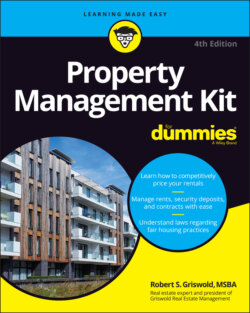Читать книгу Property Management Kit For Dummies - Robert S. Griswold - Страница 95
EYEING WHAT PROSPECTIVE RENTERS WANT
ОглавлениеSome tenants value certain improvements more than others do. So the main question is this: What features and improvements do most prospective renters want (which in turn can bring you more money in terms of higher rent)? You can’t come up with an exact answer to what amount of increased rent a particular upgrade will generate. A new granite countertop in the kitchen or new light fixtures in the dining room will have a different effect on each prospective tenant; some people are willing to pay more for those amenities, and others aren’t.
Are you feeling a bit confused about the features that prospective renters want? Never fear! The following tips can guide you:
Keep in mind what features and strengths your prospective renters will find in competitive rental units. Look for outmoded or outdated features in your own unit. Perhaps most of your competitors offer dishwashers, but you don’t have one in your unit. You may want to install a dishwasher so that you remain competitive. But don’t forget that you’ll lose cabinet space, so you need to evaluate all aspects of the potential upgrade, not just the cost. Or maybe your unit has a very old dining-room light fixture that you can easily replace with a modern light fixture or a ceiling fan with a light kit. Another simple upgrade is replacing your old electrical switches and outlets for a more modern look. Installing new hardware or refinishing the face of the kitchen cabinets are other low-cost upgrades. Many older cabinets are of good quality, and only the doors and hardware need a facelift. Pay particular attention to those items that are quick, easy, and inexpensive to replace but can improve the overall look of your unit.
When upgrading or replacing your current appliances, always compare energy-efficiency ratings, and standardize the brand and model wherever possible. One advantage of upgrading your appliances is energy efficiency. Though your tenant may be the one paying the rent, remember that green sells, and you can easily demonstrate that your unit will cost your tenant less each month in utilities with new energy-efficient appliances.The advice to standardize the brands and models of appliances in your rental units is particularly true for certain appliances; you can easily replace modular components to give the appliances a new look and extended life. Stoves, ranges, ovens, refrigerators, and washers and dryers fit into this category. When appliances such as microwaves, dishwashers, and garbage disposals fail, it’s more cost-effective to replace the units. So for this latter category of appliances, you want to take advantage of appliance vendors who have certain models on closeout or special pricing while staying with the same color scheme or finish. Bonus: Tenants generally don’t pay much attention to the brand of the garbage disposal, so you may as well take advantage of any specials. Buying a discontinued brand or model of a stove, however, may save you money up front but cost you much more in the long run, when you’re unable to find replacement parts.
If you have an older property, renovating may be more difficult because of some of the hazardous materials used in your unit’s original construction. If you suspect any hazardous materials based on the age of your property or the type of construction, be sure to have testing done before you do any work. Hazardous materials such as asbestos and lead-based paint aren’t cheap to remove. Often, you’ll be better off leaving the materials in place as long as they haven’t been disturbed. Consult an expert on removing hazardous materials before determining the extent of the renovation and the proper methods to ensure that all hazardous materials are maintained safely. Also, check with your local building-code enforcement or health department for requirements on the proper handling and disposal of hazardous materials.
The Environmental Protection Agency (EPA) has implemented a lead-safe certified renovator program, and you should use only contractors who are on the approved EPA list. See www.epa.gov/lead to find a certified lead-safe firm near you. For more information on environmental hazards, see Chapter 10.
